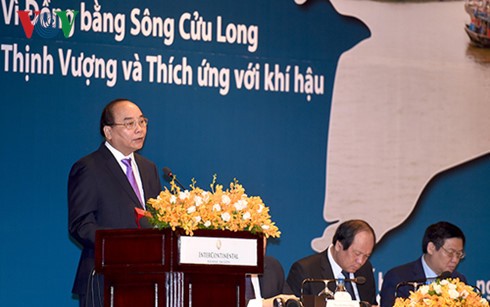(VOVworld) – Climate change has negatively impacted the Mekong Delta, a region that contributes 15% of Vietnam’s GDP. A forum named “Prosperous and Climate Resilient Mekong Delta" was convened on June 27 to call for international support for the Mekong Delta to overcome sea level rise and other climate change challenges. The participants suggested Mekong Delta provinces improve regional connection for a resilient development.

Prime Minister Nguyen Xuan Phuc addresses the forum |
The forum was co-organized by the World Bank, the Ministry of Agriculture and Rural Development, the Ministry of Natural Resources and Environment, and the Ministry of Planning and Investment in HCMC. Presentations delivered at the forum showed that the Mekong Delta plays an important role in Vietnam’s development and regional food security. The Mekong Delta is Vietnam’s biggest agricultural and fishery production, region which contributes 40% of Vietnam’s agricultural production value, 70% of fishery export revenue, 90% of rice exports, and one fifths of the total global rice exports.
Climate change impacts would reduce the Mekong Delta’s contribution to GDP
In the Mekong Delta salt water has thrust, 100 to 120 km into mainland. More than 230,000 ha of paddy fields, 9,400 ha of fruit trees, and 5,000 ha of fishery farms have been damaged. 250,000 households lack clean water for domestic use. The total productivity of winter-spring rice was reduced by 400,000 tons. In the long term, people in the Mekong Delta are predicted to be seriously impacted by climate change, including sea water rise and intensified tropical storms. Rice production is expected to lower from 6 to12%, which will influence not only Vietnam, but also global food price and food security.
Promoting connection for development
At the forum Prime Minister Nguyen Xuan Phuc said the Mekong Delta should develop a smart and resilient agriculture with high added value in Southeast Asia and Asia. Achieving this goal is one of the most difficult tasks for the national cause of industrialization and modernization.
Prime Minister Phuc said: “The Steering Committee of the Southwestern Region and Mekong Delta provinces will work with other government agencies to build regional connection and the Mekong Delta Development Strategy to promote the strength of each locality to avoid internal competition. Provinces and localities will produce specific products suitable for their advantages. We should identify the responsibility of localities in order to have appropriate support and organize production and service association to improve competitiveness.”
At the forum delegates discussed measures to respond and adapt to climate change including corporate cooperation among localities and sectors.
Enhancing cooperation with development partners
Prime Minister Nguyen Xuan Phuc underlined the role of partnership, including with the World Bank, to develop the Mekong Delta. The World Bank has provided Vietnam with incentive credit and technical support to improve the ability on weather and disaster forecast, build a climate change and sea level rise monitoring network, and finalize climate change scenarios for the Mekong Delta.
Victoria Kwakwa, World Bank Vice President for East Asia and the Pacific, said: This forum is extremely timely. It represents a platform to engage, inteact, and seek solutions through concerted actions by all stakeholders, public, private, and NGOs and with support from development partners. We all have one goal to help the low-lying and densely populated Mekong Delta region improve its resilient to challenges and sustainable prosperity. Prime Minister Phuc has given a lot of advices on how the region can promote climate change resilience. As we look into the future we also need to find better ways to address evolving challenges and we need to use technology as Prime Minister Phuc said.”
While increasing cooperation with international organizations, the Vietnamese government has invested in building industrial zones and upgrading the infrastructure in the Mekong Delta. The government has invested in scientific studies and technological applications, particularly biotechnology on fishery production, rice and fruit trees cultivation, to modernize agriculture in response to climate change.